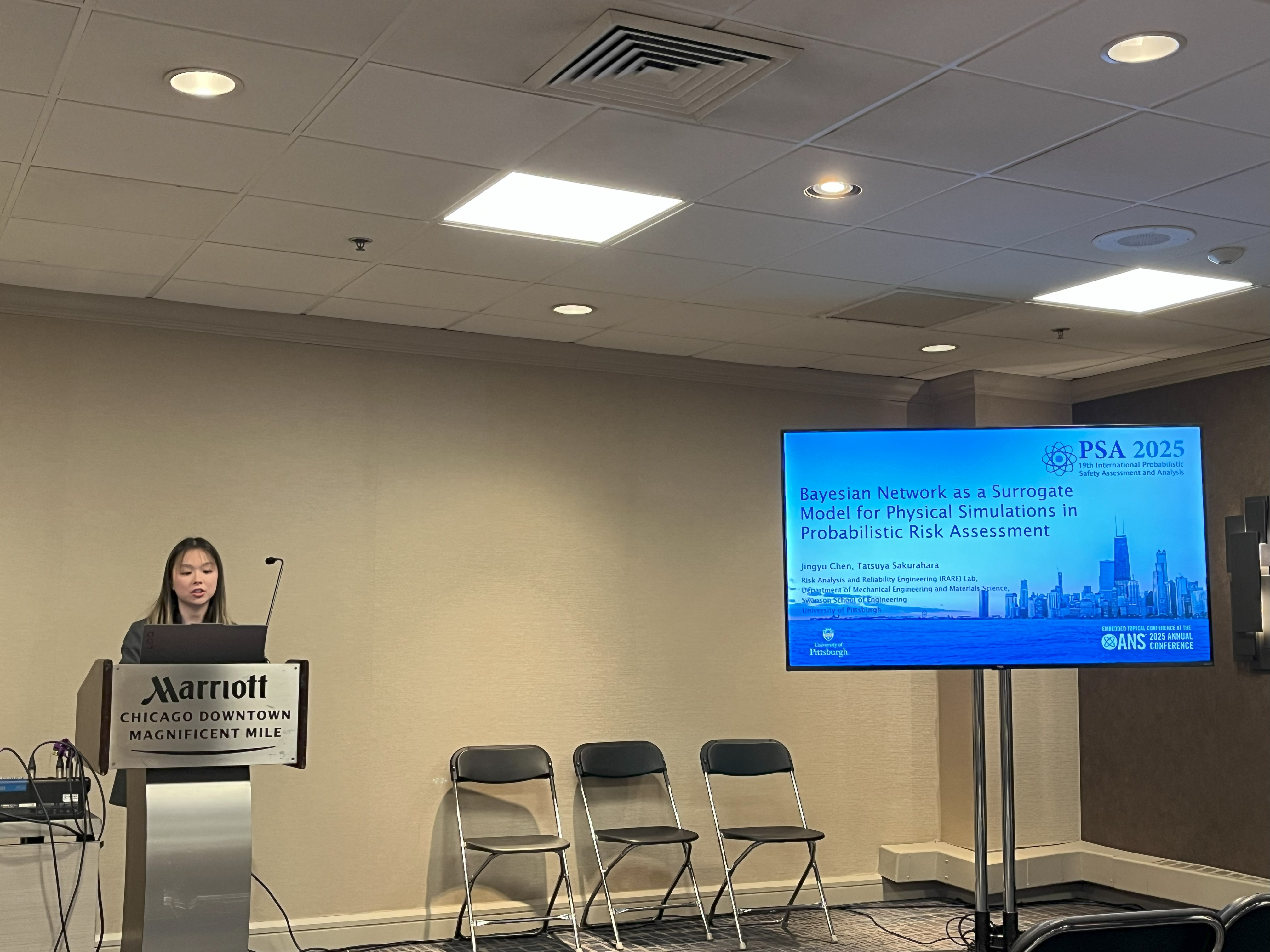News
Jean Chen Presents Undergraduate Research at PSA 2025
 Jean Chen, an undergraduate researcher at the Risk Analysis and Reliability Engineering (RARE) Lab, delivered a presentation at the 19th American Nuclear Society International Conference on Probabilistic Safety Assessment and Analysis (PSA 2025), held in Chicago, IL. Her talk, titled "Bayesian Network as a Surrogate Model for Physical Simulations in Probabilistic Risk Assessment," was presented on June 18 during the Uncertainty Analysis session.
Jean Chen, an undergraduate researcher at the Risk Analysis and Reliability Engineering (RARE) Lab, delivered a presentation at the 19th American Nuclear Society International Conference on Probabilistic Safety Assessment and Analysis (PSA 2025), held in Chicago, IL. Her talk, titled "Bayesian Network as a Surrogate Model for Physical Simulations in Probabilistic Risk Assessment," was presented on June 18 during the Uncertainty Analysis session.
Co-authored by Dr. Tatsuya Sakurahara, Director of the RARE Lab, Jean’s presentation introduced an exploratory study on using Bayesian networks (BNs) to build surrogate models for computationally expensive physical simulations in probabilistic risk assessment (PRA). The research aims to reduce computational burden while maintaining accuracy in risk estimates, particularly in contexts where repeated simulation runs are required to analyze the entire scenario space and uncertainty.
This work reflects Jean’s research efforts at the RARE Lab since September 2024. Her presentation drew active interest from the audience, with insightful questions during the Q&A session inspiring ideas for future development.
Building on the momentum from this conference, the research team is now expanding this study and preparing a full journal article to further disseminate their findings.
Dr. Sakurahara joined Pitt as a new faculty and initiated the Risk Analysis and Reliability Engineering (RARE) Laboratory.
Dr. Sakurahara joined the Nuclear Engineering Program, Department of Mechanical Engineering and Materials Science (MEMS), Swanson School of Engineering at the University of Pittsburgh. In establishing risk analysis and reliability engineering as a new research core area at the MEMS department, Dr. Sakurahara initiated the Risk Analysis and Reliability Engineering (RARE) Laboratory.
Dr. Sakurahara’s research advances risk and reliability analysis to enhance the safety and performance of complex engineering systems, particularly energy systems. The goal of his work is to support risk-informed decision-making throughout the life cycle of these systems—from design and licensing to construction and operation, aimed at enabling the deployment of next-generation nuclear energy systems and other emerging technologies.
His research integrates state-of-the-art simulations, systematic risk modeling, and probabilistic techniques. His expertise spans multiple aspects of risk and reliability analysis, including uncertainty quantification, probabilistic physics-of-failure simulation, human reliability analysis, decision analysis, and AI and machine learning for risk and reliability analysis.
Before joining Pitt, Dr. Sakurahara was a Research Assistant Professor in the Department of Nuclear, Plasma, and Radiological Engineering at the University of Illinois at Urbana-Champaign. Dr. Sakurahara earned his Ph.D. in nuclear engineering from UIUC in 2018, and his M.S. in nuclear engineering and management (2013) and B.S. in systems engineering with a concentration in environment and energy systems (2011) from the University of Tokyo, Japan. Dr. Sakurahara is a recipient of the 2022 George Apostolakis Fellowship from the International Association for Probabilistic Safety Assessment and Management.
